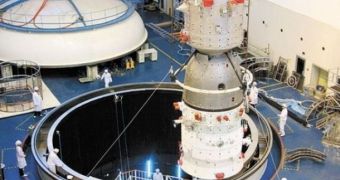The Chinese National Space Administration (CNSA) is preparing its first space module, which will set the foundation for the country’s planned space station. At the same time, astronauts in the Asian nation are also discussing future plans.
They say that collaborating with the International Space Station (ISS) would be a positive thing for both parties. While the ISS is the result of an 11-year-long cooperation between 15 nations, China is building its first orbital outpost all by itself.
CNSA plans to launch the Tiangong-1 module as soon as possible. The 8.5-ton spacecraft will form the backbone of the station, alongside another module that will be launched shortly afterwards. The two will meet each other in space.
That moment will mark the first Chinese attempt at achieving orbital docking capabilities. The nations involved with the ISS have mastered this art, after more than a decade of return flights to low-Earth orbit, for resupply and crew replacement.
The first spacecraft of its series, Tiangong-1 has already been transported to the Gansu Province, at the Jiuquan Satellite Launch Center (JSLC). Launch is scheduled for later in the year, and CNSA has arranged for a Long March II-F delivery system to ferry the module to orbit.
An unmanned Shenzhou-8 spacecraft will follow it to LEO, although at this point no clear launch date is set for the second mission. CNSA officials only said that it will occur before the end of this year, Space reports.
CNSA has already accepted about 300 flags provided by the International Astronautical Federation, which its spacecraft will take to orbit when it launches. The ceremony took place at the Paris Air Show, in France.
These flags will be brought down to Earth by an astronaut next year. At that time, China plans to conduct its first manned docking procedure, to ensure that it has the science of it figured out.
“China being in space I think is a great thing. The more nations that get into space, the better cooperation we'll have with each,” STS-135 astronaut Rex Walheim said last week, from aboard the ISS, in an interview for Reuters.
“Space is one of the biggest international brotherhoods we have,” he concluded.

 14 DAY TRIAL //
14 DAY TRIAL //